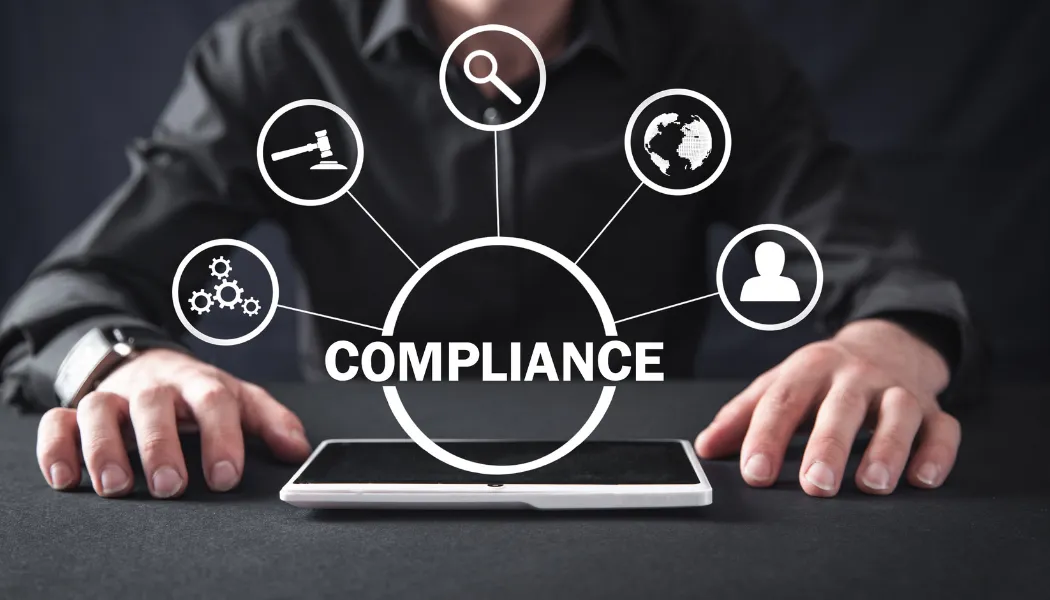May 5, 2025
Fintech Compliance: Essential Practices and Challenges

By Fraxtional LLC

Ensuring compliance in fintech has become essential. If you're a fintech firm in the United States, you face a regulatory landscape that is growing more complex and fragmented. The Consumer Financial Protection Bureau (CFPB) has extended federal oversight to major digital payment platforms, now processing over 13 billion transactions annually. In addition, several fintech sponsor banks have reported compliance-related losses exceeding $1 million. The challenge of multi-jurisdictional compliance continues to increase, driving operational costs and regulatory risks.
To help you manage this, the demand for Regulatory Technology (RegTech) solutions is surging. The U.S. RegTech market alone is expected to grow from $13.78 billion to over $30 billion within the next five years, as the need for more agile, cost-efficient compliance tools intensifies. If you fail to adapt, you risk facing hefty penalties and reputational damage.
Adopting an advanced, scalable compliance approach is vital for long-term resilience. A flexible framework that meets evolving regulatory standards is essential for survival and growth. In this post, we’ll break down the best practices you should follow, explore the key challenges you’ll face, and offer strategic solutions to help you succeed in fintech compliance.
Understanding Fintech Compliance
Fintech compliance refers to your company’s adherence to legal and regulatory standards within the financial technology space. As your business grows, staying compliant is essential for protecting sensitive customer data, avoiding legal penalties, and ensuring operational integrity. As fintech innovations continue to push boundaries, keeping up with evolving laws and regulations is crucial for maintaining your competitive edge.
In an era of increasing data breaches and financial crimes, you must adhere to relevant compliance standards like GDPR, AML, and KYC. Failure to meet these standards can lead to financial penalties, loss of trust, and severe operational disruptions.
Let’s explore why fintech compliance matters for your business and customers.
The Importance of Fintech Compliance
Fintech sits at the intersection of technology and finance, making it a prime target for regulatory scrutiny. Compliance helps ensure that your business operates within legal boundaries, protects consumer interests, and promotes fair practices. Financial data is a major target for cybercriminals, and complying with laws such as GDPR, AML, and KYC can help minimize the risk of data breaches and fraud.
Moving forward, we’ll discuss the best practices to help you keep your fintech operations compliant and secure..
Ready to streamline your compliance? Start exploring now.
Key Best Practices for Fintech Compliance

By understanding and implementing these best practices, you’ll set a strong foundation for compliance within your company. These steps will help mitigate risks and ensure your business meets the latest regulatory standards.
1. Establish a Strong Compliance Framework
A clear and well-structured compliance framework is essential to ensure compliance with regulations. Your framework should clearly outline the processes, roles, and responsibilities for compliance. This will guide everything from managing customer data to filing regulatory reports.
Components of a Compliance Framework:
- Policies and Procedures: Detailed documents outlining the steps required to comply with GDPR, AML, and KYC regulations.
- Dedicated Compliance Team: A group responsible for monitoring compliance, auditing internal operations, and training staff.
- Regular Audits: Periodic assessments of business processes and third-party relationships to ensure compliance with laws.
Establishing a strong framework ensures compliance is ingrained within the company’s operations and not considered an afterthought.
2. Stay Updated on Regulatory Changes
Regulations are constantly evolving. You must stay current with regulatory changes from data protection laws to financial transaction monitoring to avoid penalties or reputational damage.
Key Areas to Monitor:
- Data Protection Regulations: Changes in privacy laws (e.g., GDPR, CCPA) require businesses to adapt their data handling and security protocols.
- AML and KYC Updates: Anti-money laundering and Know Your Customer regulations are subject to frequent updates, especially in light of emerging financial crime trends.
- Cross-Border Regulations: As fintech companies expand globally, understanding the regulations in different jurisdictions becomes critical. The global push for Central Bank Digital Currencies (CBDCs) is intensifying, with 134 countries exploring digital currencies, potentially impacting U.S. fintech firms' international operations.
Reviewing legal updates regularly, attending industry webinars, and working with compliance experts can help fintech companies stay ahead of regulatory changes.
3. Implement KYC and AML Procedures
One of the most critical aspects of fintech compliance is ensuring that customers and transactions are properly vetted. KYC (Know Your Customer) and AML (Anti-Money Laundering) regulations are designed to protect against identity theft, financial fraud, and money laundering. Your fintech company must establish procedures to identify customers correctly and promptly report any suspicious activity to authorities.
Key KYC and AML Practices:
- Customer Identification: Collecting personal and business information from customers to verify their identity.
- Risk Assessment: Assessing the risk associated with each customer and adjusting the level of scrutiny accordingly (e.g., Enhanced Due Diligence for high-risk clients).
- Transaction Monitoring: Continuously monitoring transactions for any signs of suspicious activity or money laundering.
- Suspicious Activity Reporting (SARs) involves reporting any suspicious financial activities to regulatory bodies such as the Financial Crimes Enforcement Network (FinCEN).
Implementing these procedures helps to comply with regulations and protect the company and its customers from financial crime.
4. Prioritize Data Protection and Cybersecurity
With the increasing volume of sensitive data processed in fintech operations, ensuring data protection and cybersecurity measures is more important than ever. The financial industry sees an average cost of $6.08 million per data breach, significantly higher than other sectors. The financial industry is a primary target for cyberattacks, and a single breach can lead to significant economic and reputational damage to your company.
Data Protection Best Practices:
- Encryption: Using encryption to protect sensitive data in transit and at rest.
- Access Controls: Restricting access to sensitive data based on organizational roles and responsibilities.
- Incident Response Plan: Developing and maintaining a response plan in case of a cybersecurity breach.
- Data Minimization: Only collecting and storing the minimum customer data required to perform services.
Prioritizing data security and having a solid cybersecurity strategy helps fintech companies avoid breaches, fines, and the loss of customer trust.
5. Train and Educate Employees
A compliance program is only as good as the people who implement it. Your employees must be regularly trained on compliance to understand the latest regulations and their role in upholding them. Regular training also helps identify potential non-compliance areas before they become significant issues.
Training Areas to Focus On:
- Regulatory Knowledge: Ensuring employees know the key laws and regulations that affect the business.
- Reporting Procedures: Teaching employees to identify and report suspicious activities or compliance breaches.
- Data Handling Best Practices: Educating employees on handling customer data securely and complying with data protection laws.
Investing in training helps create a culture of compliance within the organization, where everyone understands their responsibilities.
6. Maintain Transparent Communication with Customers
Transparency is key to building and maintaining trust with customers. A clear communication strategy that explains your company’s compliance efforts and data protection practices can help reassure customers that their data is being handled securely. It’s also important to be clear about the terms and conditions of services provided and any risks involved.
Best Practices for Communication:
- Clear Privacy Policies: Ensure privacy policies are easy to understand and explain how customer data will be used and protected.
- Regular Updates: Communicate any changes in compliance practices, data usage, or service terms to customers.
- Customer Support: Provide accessible channels for customers to inquire about compliance-related concerns.
By maintaining clear and honest communication, businesses can build customer confidence and comply with regulatory requirements related to transparency.
Following these key best practices can help fintech companies establish a strong foundation for their compliance efforts. The following section will explore the key challenges of building and maintaining a solid compliance framework.
Take control of your compliance strategy—find out more today.
Challenges in Fintech Compliance

The fintech industry faces several significant compliance challenges. These hurdles include navigating complex and fragmented regulations, adapting to rapid technological advancements, managing the high costs of compliance, addressing cybersecurity threats, and meeting global standards.
1. Complex and Fragmented Regulations
The regulatory landscape for fintech is fragmented across different jurisdictions, making it challenging for companies to navigate. Regulations differ significantly from country to country and even between states or regions, requiring companies to adopt a flexible approach to compliance.
2. Rapid Technological Advancements
Fintech is an industry driven by rapid innovation, which often outpaces regulatory frameworks. This creates a challenge in ensuring that regulations are aligned with emerging technologies such as blockchain, artificial intelligence, and digital currencies.
3. Cost of Compliance
Implementing and maintaining compliance programs can be costly, especially for startups and small fintech companies. From hiring compliance professionals to investing in technology, the costs can be a significant burden for many companies, especially when regulatory requirements continue to evolve. The OCC's proposed rule under the Financial Data Transparency Act estimates a revised annual burden of 62,239 hours, with associated costs of $605,520 for financial institutions.
4. Cybersecurity Threats
Fintech companies handle sensitive financial data, making them prime cyberattack targets. Compliance requirements often include stringent cybersecurity standards to protect user data. Balancing security and compliance while ensuring a smooth user experience is a constant challenge.
5. Compliance with Global Standards
As fintech companies often operate globally, they must comply with international standards, such as the General Data Protection Regulation (GDPR) or the Payment Card Industry Data Security Standard (PCI DSS). This requires navigating different regulatory environments and ensuring their systems meet regional standards.
In the next section, we’ll highlight how Fraxtional can assist fintech companies in overcoming compliance challenges and simplifying the process.
How Fraxtional Can Help with Fintech Compliance Challenges?
Navigating fintech compliance can be tough, but Fraxtional makes it easier. We offer flexible, expert compliance solutions tailored to your business. Whether you need to stay on top of changing regulations, manage risks, or address cybersecurity concerns, Fraxtional provides the leadership and tools you need.
What We Offer:
- On-Demand Compliance Leadership: Access experienced compliance officers without needing full-time hires.
- Tailored Risk Assessments: Identify gaps and strengthen your compliance program.
- Customized Compliance Programs: Ensure your business meets regulatory standards like KYC, AML, and data privacy.
- Global Compliance Support: Stay compliant across different regions with our expertise in international regulations.
End Notes
Maintaining fintech compliance is an ongoing process that requires constant attention and adaptability. Businesses can mitigate non-compliance risks by following best practices such as establishing a compliance framework, staying updated on regulatory changes, and implementing KYC and AML procedures. Additionally, addressing cybersecurity threats, ensuring data protection, and educating employees will contribute to a strong compliance culture within the organization.
Fintech companies must remain agile and responsive to new challenges in a constantly evolving landscape. By prioritizing compliance, businesses avoid potential penalties and build trust with their customers, ensuring long-term success and sustainability in the industry.
Ready to take control of your compliance?
Contact Fraxtional today to streamline your fintech compliance and stay ahead of the curve.
FAQs
blogs
Don’t miss these
Let’s Get Started
Ready to Strengthen Your Compliance Program?
Take the next step towards expert compliance solutions. Connect with us today.




